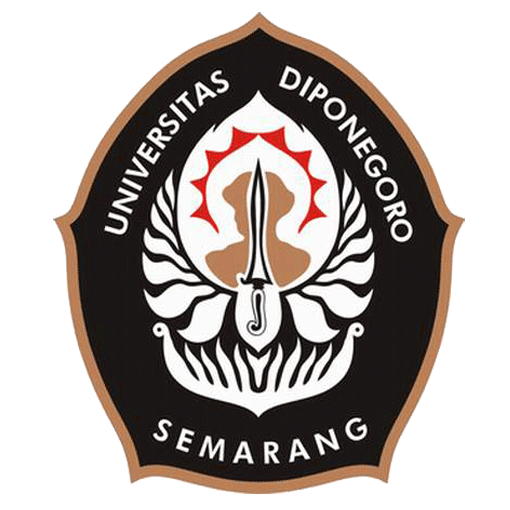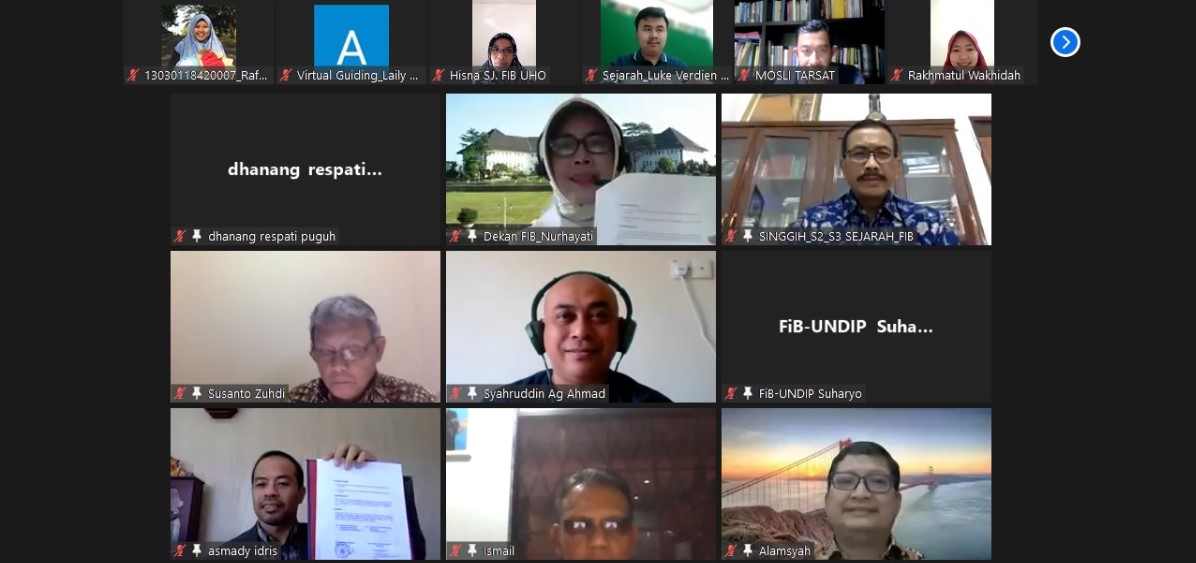In order to realize the vision of Faculty of Humanities to become an excellent research faculty in Southeast Asia by 2025 in the field of culture which includes literature, language, history, and anthropology, the History Doctoral Study Program held a webinar “Exploring Indonesian Maritime History: Substance and Methodology” (18/9). Presented as speakers are Prof. Dr. Ismail Ali from Universiti Malaysia Sabah and Prof. Dr. Susanto Zuhdi, M. Hum. from the University of Indonesia.
The webinar is also a momentum for the signing of a memorandum of understanding of cooperation between Faculty of Social Sciences and Humanities, Universiti Malaysia Sabah and Faculty of Humanities, Diponegoro University. Prior to the signing of the memorandum of understanding, a collaboration was established with result of publication of a book entitled “Sea and the Dynamics of the Archipelago Society Volume I”. The signing of memorandum of understanding was attended by faculty leaders, namely Dr. Nurhayati, M. Hum. as the Dean of Faculty of Humanities, Diponegoro University; Dr. Alamsyah, M. Hum., Vice Dean for Academic and Student Affairs; Dr. Suharyo, M. Hum., Deputy Dean of Finance and Personnel; and Dr. Dhanang Respati Puguh, Head of Department of History. Meanwhile, representatives from Faculty of Social Sciences and Humanities of Universiti Malaysia Sabah are Assoc. Prof. Dr. Asmady Idris as Dean of Faculty of Social Sciences and Humanities; Dr. Jalihah MD Shah, Deputy Dean for Academics; Dr. Syahruddin Awang, Deputy Dean of Research; and Dr. MD. Shaffie Abdul Rahim, Head of History Program.
“In October, Prof. Dr. Singgih Tri Sulistiyono, M. Hum. who serves as the Head of History Postgraduate and Doctoral Study Programs will also be the speaker of the webinar at Universiti Malaysia Sabah,” said the Dean of Faculty of Humanities.
In his material, Prof. Susanto Zuhdi conveyed about “Ports, Sea Routes: The Study of Maritime History”. The Southeast Asian region, especially the Archipelago, has long been a magnet for international shipping and trade activities because it has a variety of products needed by the international market and has social capital owned by the people of the Archipelago (Malay). However, colonialism has interrupted the achievements of the people of the archipelago so that there is a domination of colonial power. After the World War ended, decolonization took place including in the writing of history. Based on that, there needs to be decolonization or liberation of historical writing from the domination of colonialism.
“Maritime history historiography is often still in a European-centric context, one of which is because of the colonial experience. That experience raises the problem of avoiding self-owned shipping lanes (the people of the Archipelago). Many history books only follow in the footsteps of the Dutch. For example, when the Dutch turned their attention to Java and western Indonesia, the histories of the Moluccas and other eastern Indonesia regions were stopped and ignored. This is what underlies writing or research on islands that have been neglected in history,” explained Prof. Susanto.
Prof. Dr. Ismail Ali discussed material on maritime as a methodology in writing history, how to explain history, how to judge historical truth, and how historical facts are interpreted. In general, maritime history research methodologies are classified in three ways, namely planning, application, and analysis. Prof. Ismail emphasized the importance of methodology, especially because maritime history has a special and unique characteristic. In addition, it is also related to changes and developments in the discipline of history. History must stand as a discipline in its own right. The branches in maritime history are also very broad.
“The most important key is understanding the development of maritime history historiography written by scholars. It is important to understand the meaning of maritime historiography, whether the studies are problem oriented or non-problem oriented regarding the methodology used. It must also be understood that the scope of maritime history is very broad. Therefore, the most important thing is to place maritime history as a scientific study of past human activities at sea,” he concluded. (Rafngi – History / Linda – Public Relations)
Translated by: Titis (Public Relations)

